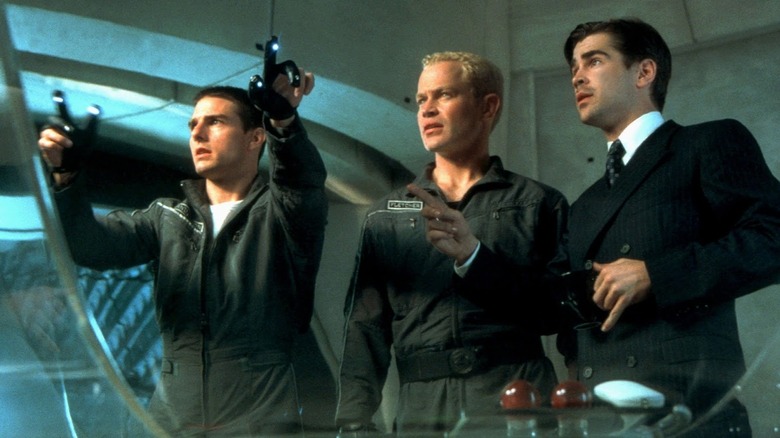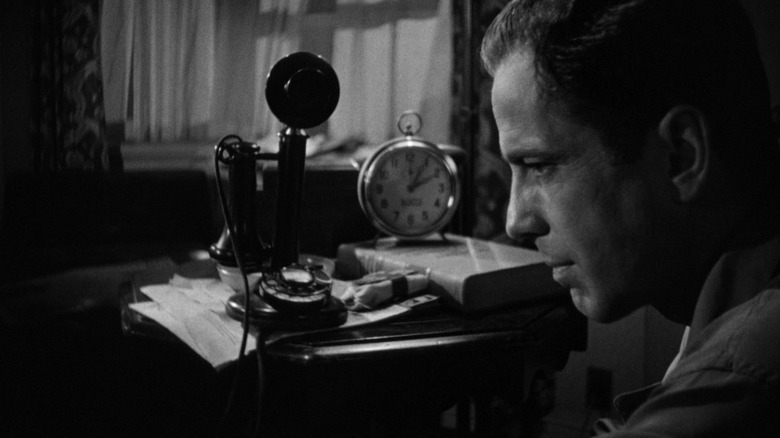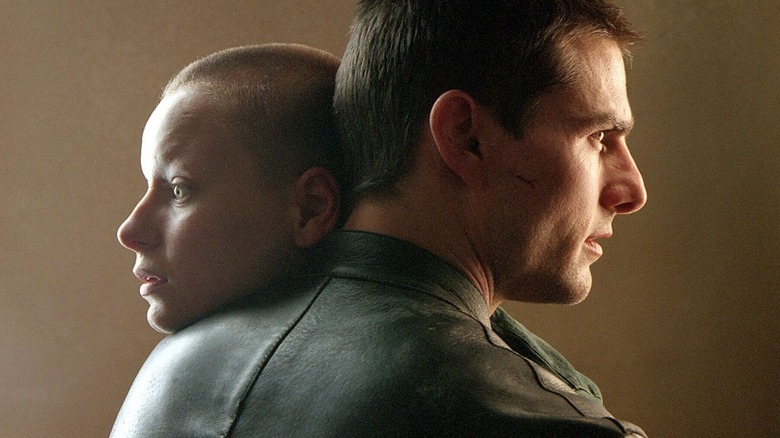Steven Spielberg's Biggest Minority Report Inspiration Had Nothing To Do With Sci-Fi
Steven Spielberg's filmmaking techniques took a large bound forward in 2001 with the release of "A.I. Artificial Intelligence." The sci-fi film, set in a near future populated by conscious androids, was a project Spielberg took over from an ailing Stanley Kubrick, who passed on it when he felt Spielberg could do it better. In "A.I.," Spielberg's photography and editing were very different from the slick, adventure films and glossy prestige pictures he had become popular making. Now everything was hazy, staid, more deliberate.
Although he had already won three Oscars (two for "Schindler's List" and one for "Saving Private Ryan") and was widely considered to be a reigning master of Hollywood's blockbuster class, Spielberg evolved. After 2001, Spielberg's career bifurcated into dispassionate effects-based thrillers wherein the filmmaker was merely experimenting, and deeply passionate political thrillers that used the politics of the past to reflect on issues of the day.
The official first step Spielberg took into his "latter day" era was "Minority Report," a 2002 sci-fi noir based on a novella by Philip K. Dick. Set in the near future, "Minority Report" follows a unit of cops who have access to a trio of future-predicting psychics nicknamed "Pre-Cogs." The cops see when someone is going to commit a murder, and rush out to arrest them before they have an opportunity to do so. Naturally, the character played by Tom Cruise will become embroiled in a future scandal when the Pre-Cogs predict he will murder someone he's never met.
In 2002, Spielberg talked to Roger Ebert, and he revealed that "Minority Report" wasn't thrilling to him on a sci-fi level, but he was very keen on exploring the detective/film noir aspects. Spielberg looked to famed detective stories for his inspiration.
Sam Spade and Philip Marlowe inspired Minority Report
The sci-fi world of "Minority Report" is impeccable, and both Speilberg and his screenwriters Scott Frank and Jon Cohen constructed a detailed world of targeted holographic advertising, out-patient organ transplants, driverless cars that can climb walls, and mechanical crime spiders that can infiltrate locked apartments to scan people's eyeballs. These details, however, were incidental to Spielberg, mere pieces of the background. The story was more important to the filmmaker, and he revealed that he watched some of his favorite old detective movies as inspiration. He said:
"I had John Huston in my ear on 'Minority Report.' I went back and looked at 'The Maltese Falcon' and [Howard] Hawks' 'The Big Sleep' to see how some of those film noir mysteries were resolved. They didn't dot every 'i' and cross every 't.' They tried to keep you off-balance. They asked more questions than they could answer in those days."
"The Maltese Falcon" was released in 1941, and starred Humphrey Bogart as Dashiell Hammett's Sam Spade, a P.I. who is hired to locate a femme fatale's missing sister, but uncovers a plot surrounding a mysterious falcon statue coveted by a rogue's gallery of ruffians. "The Big Sleep," based on the celebrated Raymond Chandler novel, also stars Bogart, this time as Philip Marlowe, a detective who delves into the seedy underbelly of Los Angeles.
It's worth noting that the Pre-Cogs in "Minority Report" are named Agatha, Arthur, and Dashiell, presumably after mystery authors Agatha Christie, Arthur Conan Doyle (or perhaps Robert Arthur, Jr.), and Dashiell Hammett. Spielberg's inspirations are revealed right on the surface.
'Let me worry about the sci-fi element,' Spielberg said about Minority Report
Screenwriter Scott Frank has long been a powerhouse in Hollywood, having been nominated for Oscars for "Out of Sight" in 1998 (based on the novel by Elmore Leonard), and for "Logan" in 2017. He also wrote the screenplays for "Get Shorty" (also based on a novel by Elmore Leonard) as well as for "Malice," "Little Man Tate," and "Dead Again," all excellent. More recently, he wrote and directed "The Queen's Gambit" and the noir series "Monsieur Spade," another Sam Spade story. Spielberg needed a film noir/crime writer in his corner, and Frank was pleased to help.
The problem was: Frank hadn't ever written a sci-fi story before (the soul-transmigration conceits of "Dead Again" notwithstanding). Spielberg, however, knew he had sci-fi on lock, saying:
"I went to Scott Frank for the screenplay. He wrote 'Get Shorty' and 'Out of Sight.' I gave him the original short story by Philip K. Dick and he said he didn't know anything about science fiction. I said, 'Let me worry about the sci-fi element. Just write a terrific detective yarn. This taps into your strength. This is a murder mystery, a film noir, a whodunit.'"
Tom Cruise, also present for the conversation with Ebert, noted that the Pre-Cog premise of "Minority Report" was fine for a novella, but that a feature film required more character work and personal involvement. The actor credits Frank for bringing those elements to the movie.
Eerily, Spileberg's 2002 film predicted the future of our relationship with media: "In the future," he said, "television will be watching us, and customizing itself to what it knows about us." With data tracking and ad-bots following us everywhere, he's not wrong.


